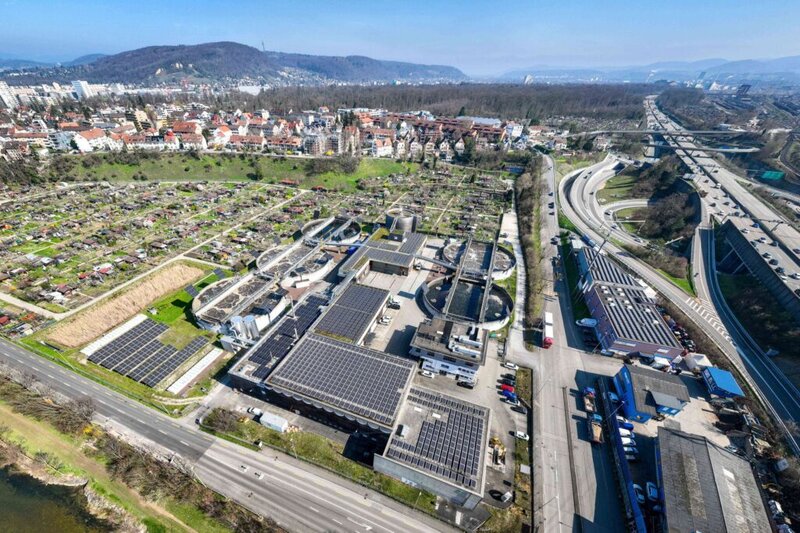New CHP Plant: Biogas from Sewage Sludge, Self-Generated Electricity, and District Heating
Facts & figures

Combined Heat and Power Plant for Digestion Process and District Heating
Since 2009, the ARA Birs in Birsfelden has been successfully using a CHP plant to generate electricity. In October 2023, this plant was retired due to age and replaced with a modern unit that has a maximum electrical output of 360 kW and a maximum thermal output of 399 kW, operating on biogas.
The biogas is produced from the sewage sludge processed at the ARA, which is first dewatered in a centrifuge and then fed into a digestion process. The resulting biogas consists of 65% methane. "We primarily use the heat generated by the CHP for the digestion process of the dried sewage sludge, which occurs at exactly 38°C. However, the CHP is so efficient that we only need about one-third of the heat for our own use. The surplus is fed into an extensive district heating network," explains Patrick Lüthy, the plant manager of ARA Birs and ARA Birsig.
In combination with two powerful heat pumps, which extract heat from the treated wastewater at ARA Birs, this heat is supplied to the Lehenmatt Birs district heating network. Since 2022, the waste heat from ARA has been used to heat the Lehenmatt district in Basel, parts of Birsfelden, and to provide the base load for St. Jakob Park and the St. Jakob sports facilities. The cooperation between the district heating network and the cantons of Baselland and Basel-Stadt has already been very successful, with the district heating network continuously expanding. Around 2,500 households in the Lehenmatt district will be supplied with ecological heat in the future.
Efficient CHP Plant with Excellent Performance
The CHP plant, a type Agenitor 408 BG/ct80 from the manufacturer 2G, was installed by CHP specialists IWK (Integrierte Wärme und Kraft AG). It boasts an electrical output of 180 to 360 kW and an electrical efficiency of nearly 42%, which is an industry-leading figure. "We fully utilize the electricity generated by the new CHP plant to operate our own installations and facilities. This also reduces the operating costs of the ARA. Overall, we can maintain self-sufficient operations with high efficiency during regular operation. Thanks to the excellent thermal output, we have also become a reliable heat supplier with the new CHP plant," says Patrick Lüthy.
Challenges of Space, Time, and Ventilation
In Birsfelden, space was the main challenge for system supplier IWK. "Since the building housing the machine room does not belong to the ARA, we could not install a standard ventilation system and had to implement a special room cooling system to dissipate the engine waste heat. The existing gas treatment system was also upgraded with a new activated carbon filter and a gas analysis system, which were housed in a new room," reports Rolf Isenring from IWK.
In contrast to ARA Birs, the new CHP plant at ARA Ergolz 2 in Füllinsdorf was delivered as a complete container solution with all peripheral devices already installed. This allowed for a quick setup and connection to the existing gas heating lines. Additionally, a new gas treatment system was installed here as well. To ensure consistent gas quality, two new activated carbon filters were installed, capable of eliminating the highly variable byproducts from industry. However, time was also a factor at Ergolz 2, as the dismantling of the old CHP plant from the machine room proved to be very labor-intensive.
Forward-Looking Planning as the Basis for Success
As mentioned earlier, wastewater treatment in Baselland is managed in a coordinated manner. With forward-looking planning, a networked approach, and a strong commitment from the cantons of Baselland and Basel-Stadt to move away from natural gas and other fossil fuels, the decision to generate biogas from biomass has been successfully implemented at ARAs Birs and Ergolz 2. Alongside the renewal of the CHP plant in Birsfelden, the outdated CHP plant in Füllinsdorf was also replaced with a new model of the same type. Unlike in Birsfelden, the CHP plant in Füllinsdorf currently serves only to supply energy and heat for its own installations. However, there are already plans to feed district heating into networks from Ergolz 2 in the future.
The ARA Birs and ARA Ergolz 2 are excellent examples of how cooperation, coordinated planning, and forward-looking investments can successfully implement electricity and heat production from biogas. This example is sure to inspire other cantons and cooperations to pursue sustainable energy use from biogas.
The significance of the ARA Birs project was further highlighted by the "Médaille d’eau" award, which was presented to the operators in November 2023. This award, given by the InfraWatt association and the Swiss Association of Water and Wastewater Professionals (VSA), is awarded every five years to ARA operators who demonstrate commitment to energy efficiency, renewable energy generation, and the reduction of greenhouse gas emissions.











